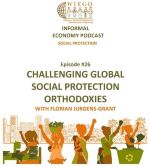| |
|
| |
|
| |
|
| |
A Global Fund for Social Protection. Views from Selected Low-income Countries |
| |
|
| |
By Charles Lwanga-Ntale
LABOUR AND SOCIAL JUSTICE. The voices of low-income countries (LICs) in the social protection discourse are not yet being listened to, and more must be done to increase their participation throughout the Global Fund for Social Protection (GFSP) programme cycle.
The primary objective of the study is to give LICs more of a voice in the debate on the establishment of the GFSP, by accessing better and more recent evidence of LIC views, in light of the fact that these may differ from those of middle-income countries. Specifically, the study seeks to establish the extent to which LIC governments prioritise publicly funded SP and how this reflects the priorities of their populations; whether funding is predictable and long term; the concerns that governments have regarding autonomy; interest in technical cooperation on SP strategies; etc. Read more |
| |
|
| |
|
| |
Investments in social protection and their impacts on economic growth |
| |
|
| |
Tax Financing Options A new report for the International Trade Union Confederation (ITUC) examining the effects of financing social protection has found that progressive taxation produces the highest returns.
The report shows the economic benefits of social protection by examining the different financing options that states have at their disposal in order to strengthen and extend their social protection systems.
The study simulated the effects of different tax-financing scenarios for social protection on household income, employment and overall GDP. The analysis was carried out in Bangladesh, Colombia, Costa Rica, Georgia, Ghana, India, Rwanda and Serbia.
The report found that financing social protection through progressive forms of taxation – such as progressive income tax, corporate tax, and capital tax – generates positive social and economic outcomes, debunking the myth that such forms of taxation are a drag on employment and growth. Read more |
| |
|
| |
|
| |
Challenging Global Social Protection Orthodoxies: Informal Economy |
| |
|
| |
 |
Over the last few years, universal social protection and the government responses to the Covid-19 crisis has generated important debates in the field of social protection.
The Universal Social Protection 2030 framework, for instance, has gained support from a variety of key social protection stakeholders, including national governments, the ILO, IMF, World Bank, and other United Nations agencies, as well as global civil society organizations.
However, certain key principles and actions remain contested in practice at both the level of global financial institutions and within the roll-out of schemes at national level – which highlighted the importance of the role of the ideas.
In order to unpack, shed light into these assumptions and help us understand these dominant ideas and the actors behind it, we invited Florian Jurgens-Grant. Florian is leads, at WIEGO, the project “Challenging the global orthodoxies which undermine Universal Social Protection”. Before joining WIEGO, he worked on social protection for the ILO and HelpAge International. Read more |
| |
|
| |
|
| |
Conference Invitation: Social Protection, How to make it happen? |
| |
|
| |
More than half of the world still lacks access to social protection. However, the consequences of Covid-19 have awakened awareness everywhere of the urgent need to move towards universal social protection.
Where do we stand today? What are the current challenges of social protection in the world and how does Belgian cooperation contribute to addressing these?
The Belgian dialogue USP2030 invites you to reflect on these issues at a Conference on 17 May 2022, from 9am to 5 pm.
With the participation of Meryame Kitir, Belgian Minister for Development Cooperation; Jutta Urpilainen, European commissioner for international partnerships ; Shahra Razavi Director of the Social Protection Department of the International Labour Organisation (ILO); Olivier De Schutter, Special Rapporteur on extreme poverty and human rights; Sharon Burrow, General Secretary of the International Trade Union Confederation (ITUC) and many other partners in international cooperation. Registration here Read more |
| |
|
| |
|
| |
The Pandemic is Not Over |
| |
|
| |
By Christy Braham
The rhetoric of an easing COVID-19 pandemic obscures the array of occupational health and safety risks that the world’s informal workers still face. The intersecting global health and economic crisis, combined with continued local and national COVID-19 restrictions, deficiencies in public health responses and a lack of meaningful economic and infrastructural support, continues to have a significant impact on workers’ physical and mental health and wellbeing. Read more. |
| |
|
| |
|
| |
110th Session of the International Labour Conference |
| |
|
| |
Upcoming ILO event. Geneva, 27 May-11 June 2022. Read more |
| |
|
| |
|
